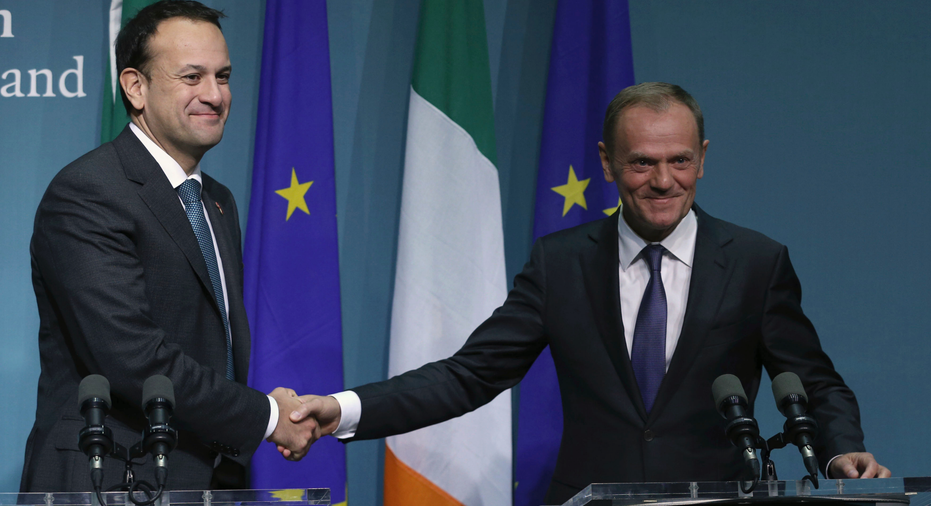AP Explains: Why Irish border is the thorniest Brexit issue

LONDON – Brexit negotiations are at a crucial stage, with Britain and the European Union making a push to settle major divorce terms ahead of a key summit later this month. Agreement is close on matters of money and citizens' rights, but progress is being stalled by the status of the Irish border and British Prime Minister Theresa May said Monday that "further negotiation and consultation" is needed.
Here's a look at why the border has become a formidable frontier to progress on Brexit.
___
WHY IS THE IRISH BORDER CRUCIAL IN BREXIT TALKS?
As part of the United Kingdom, Northern Ireland will be leaving the EU. That will create a 310-mile (500-kilometer) land border with the Republic of Ireland, which will remain a member of the EU.
At present, the border is essentially invisible: the almost 300 crossing points have no customs posts or border infrastructure, and thousands of people live on one side and work, shop or go to school on the other.
This is possible in large part because both the U.K. and Ireland are part of the EU's borderless single market for goods and services as well as the tariff-less customs union, which also includes some non-EU states like Turkey.
The British government says that when it leaves the EU in March 2019 it will also leave the single market and the customs union. All the same, May's government has promised there will be no "hard border" — but has been hazy on the details.
Ireland and the other EU members are demanding the U.K. provide details of how customs checkpoints and other border obstacles can be avoided before negotiations can move on to their next phase of discussing post-Brexit relations like trade.
____
WHAT WOULD BE THE IMPACT OF A HARD BORDER?
Businesses on both sides of the Irish border have grown used to operating in an "all-island economy," in which goods and workers flow freely. Northern Ireland dairy farmers ship milk to the south to be processed. Ireland's famous Guinness stout goes north to Belfast for bottling. Anything that makes that seamless movement harder, whether customs checks or new tariffs, could have a major impact on trade.
And it's about more than just the economy. A generation ago, during Northern Ireland's violent "Troubles," the border bristled with military watchtowers and checkpoints. They disappeared after the 1998 Belfast peace accord, and since then the boom in cross-border travel and trade has helped underpin the peace process. Many people in Northern Ireland are wary of any changes that could undermine that progress.
____
WHAT IS THE SOLUTION?
One solution is to allow Northern Ireland to stay in the customs union when the rest of the U.K. leaves. But that idea is fiercely opposed by Northern Ireland's Democratic Unionist Party — and May's minority government relies on DUP support to stay in power.
The DUP is a pro-British Protestant party, and says it will refuse to back any deal that treats Northern Ireland in any way different from the rest of the U.K.
"The economic and constitutional integrity of the U.K. must not be compromised in any way," DUP leader Arlene Foster said Monday.
Negotiators have been discussing an agreement that would commit Britain to maintaining "regulatory alignment" between Northern Ireland and Ireland after Brexit. That would make it easier to avoid a hard border. But it would also limit the U.K.'s ability to change its economic regulations in order to strike new trade deals around the world.
Even if a compromise can be found to satisfy the DUP, some pro-Brexit Britons would see such an agreement as unfairly tying Britain's hands as it tries to build new economic relations outside the EU.



















